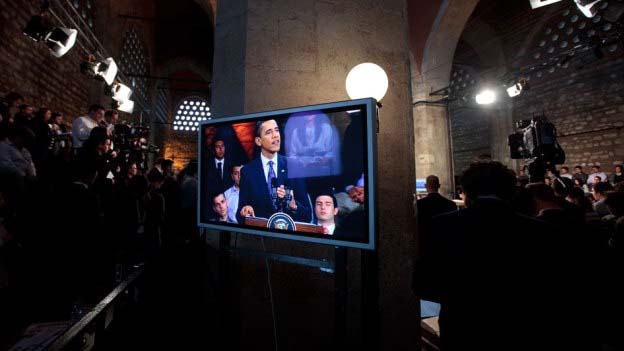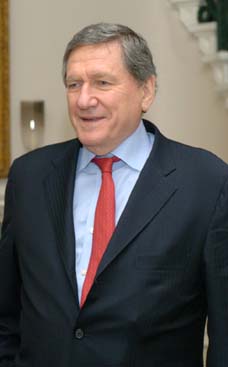
President Obama has demonstrated a strong personal commitment to strengthening relations between the United States and the Muslim world, in support of common security, political, economic, and social interests. He needs an army, of civilians, behind him. President Obama has a vital role to play in forging this new relationship, but he needs to harness the energies of U.S. businesses, universities, charitable institutions, non-governmental organizations, faith groups, and private citizens if he is to sustain it. We will need to see more educational and professional exchanges, sister cities programs, jointly produced media products, co-developed cultural activities, joint scientific research projects, co-developed social networking sites, co-produced fundraisers for humanitarian causes, co-written textbooks. Such engagement contributes to mutual trust and tangible partnerships that solve real problems concerning education, employment, energy, and commerce. President Obama's political instincts are right: a change in America's approach toward the Muslim world -- one that seeks to build common ground with faithful majorities while marginalizing fanatics -- will ultimately be the most successful strategy to diminish support for Al Qaeda and likeminded terrorist networks, find solutions to persistent conflicts, and enhance global prosperity.
Stephen R. Grand and Kristin M. Lord write: To Rebuild U.S.-Muslim World Relations, Obama Is Not Enough
To Rebuild U.S.-Muslim World Relations, Obama Is Not Enough
by Stephen R. Grand and Kristin M. Lord
Caption: President Barack Obama addresses his remarks at a town hall meeting Tuesday, April 7, 2009, at the Tophane Cultural Center in Istanbul. White House Photo/Chuck Kennedy
President Obama has moved rapidly to mend the frayed relationship between the United States and the Muslim world, spawning a new if guarded optimism in predominantly Muslim societies. According to a BBC World Service Poll, 51% of Turks, 58% of Egyptians, and 64% of Indonesians believe that President Obama will improve America's relations with the rest of the world.
Unfortunately, President Obama cannot repair this important relationship alone. To promote U.S. interests -- including a stable, prosperous, and secure Middle East -- our country must also build a dense network of personal relationships and partnerships between Americans and Muslims globally.
Such relationships are not a feel-good extra. As America learned during the Cold War, advancing national security interests requires a grand strategy that encompasses military force, diplomacy, economic statecraft -- and also public diplomacy.
The president has already taken steps to redefine America's relationship with the world's Muslim community. His inaugural address called for America to "seek a new way forward, based on mutual interest and mutual respect." In his first week in office, he signed an executive order to close the prison at Guantanamo Bay, met with military leaders to underscore his intention to withdraw troops from Iraq, and appointed George Mitchell as a special envoy to work toward a Middle East peace agreement. He granted his first official interview to the Arab television station Al-Arabiya, where he observed that "the United States has a stake in the well-being of the Muslim world."
President Obama's political instincts are right: a change in America's approach toward the Muslim world -- one that seeks to build common ground with faithful majorities while marginalizing fanatics -- will ultimately be the most successful strategy to diminish support for Al Qaeda and likeminded terrorist networks, find solutions to persistent conflicts, and enhance global prosperity. The president has bipartisan Congressional backing. His commitment was echoed by both Senator Kerry and Senator Lugar in recent Senate hearings on U.S.-Muslim World engagement,
This task will not be easy. A new relationship between Americans and the Muslim world must start by overcoming high levels of anger, distrust, and misunderstanding. In a Gallup poll of Muslims worldwide, a majority cited a sense of humiliation and a perceived lack of understanding from the West as key factors in shaping negative attitudes toward the United States. A majority of Americans surveyed answered either "nothing" or "I don't know" when asked what they admired most about Muslims and Islam.
President Obama has a vital role to play in forging this new relationship, but he needs to harness the energies of U.S. businesses, universities, charitable institutions, non-governmental organizations, faith groups, and private citizens if he is to sustain it. We will need to see more educational and professional exchanges, sister cities programs, jointly produced media products, co-developed cultural activities, joint scientific research projects, co-developed social networking sites, co-produced fundraisers for humanitarian causes, co-written textbooks. Such engagement contributes to mutual trust and tangible partnerships that solve real problems concerning education, employment, energy, and commerce.
Our experience suggests that such engagement is not only possible but also mutually rewarding. At the annual U.S.-Islamic World Forum sponsored by the Brookings Institution and the State of Qatar, we pair science and technology leaders, arts and cultural leaders, and faith leaders from the United States and the Muslim world to discuss how they might work together.
To more fully engage the private sector, not just in the Muslim world but globally, a recent Brookings study recommends the creation of a new public-private organization called the USA World Trust. The Trust would support the kind of people-to-people engagement that will present a more positive image of America, contribute to an environment of mutual respect and understanding, promote shared values and their champions, counter extremist ideologies, and support our government's public diplomacy efforts. These activities contribute to an environment in which advancing national interests is both easier and more successful.
President Obama has demonstrated a strong personal commitment to strengthening relations between the United States and the Muslim world, in support of common security, political, economic, and social interests. He needs an army, of civilians, behind him.
Stephen R. Grand directs the Brookings Project on U.S. Relations with the Islamic World at the Saban Center for Middle East Policy. Saban Fellow Kristin M. Lord recently published the Brookings report "Voices of America: U.S. Public Diplomacy for the 21st Century."











